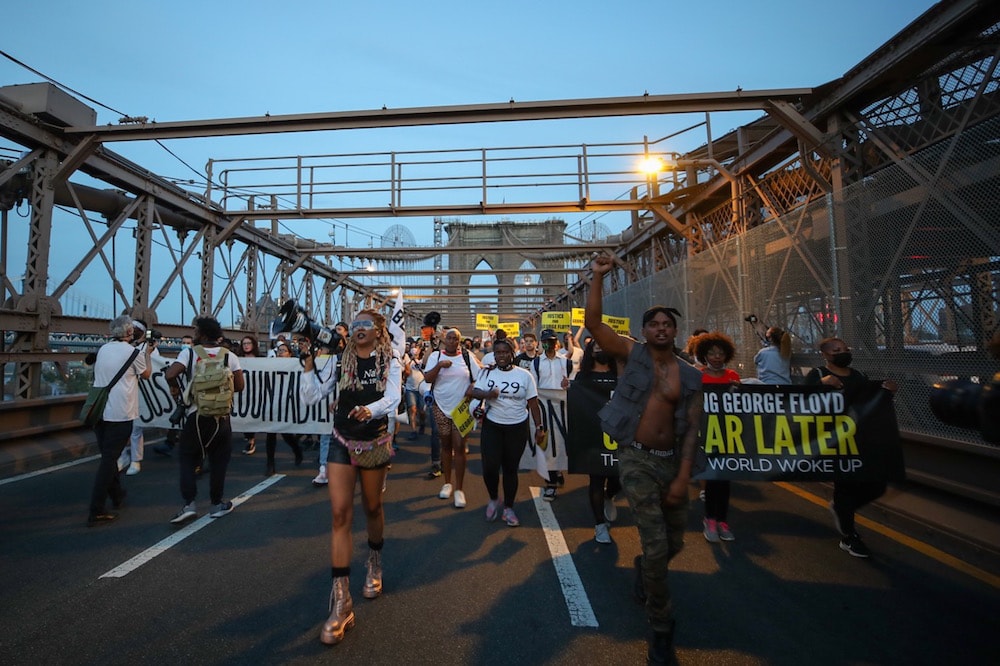“Black lives matter on the streets. Black lives matter on the internet.” The anniversary of George Floyd's murder has inspired EFF to reflect on these commitments and the work of so many courageous people who stood up to demand justice.
This statement was originally published on eff.org on 8 June 2021.
“Black lives matter on the streets. Black lives matter on the internet.” A year ago, EFF’s Executive Director, Cindy Cohn, shared these words in EFF’s statement about the police killings of Breonna Taylor and George Floyd. Cindy spoke for all of us in committing EFF to redouble its efforts to support the movement for Black lives. She promised we would continue providing guides and resources for protesters and journalists on the front lines; support our allies as they navigate the complexities of technology and the law; and resist surveillance and other high-tech abuses while protecting the rights to organize, assemble, and speak securely and freely.
Like many of you, the anniversary of George Floyd’s murder has inspired us to reflect on these commitments and the work of so many courageous people who stood up to demand justice. Our world has been irrevocably changed. While there is still an immeasurably long way to go toward becoming a truly just society, EFF is inspired by this leaderful movement and humbled as we reflect on the ways in which we have been able to support its critical work.
Surveillance self-defense for protesters and journalists
EFF believes that people engaged in the Black-led movement against police violence deserve to hold those in power accountable and inspire others through the act of protest, without fear of police surveillance of our faces, bodies, electronic devices, and other digital assets. So, as protests began to spread throughout the nation, we worked quickly to publish a guide to cell phone surveillance at protests, including steps protesters can take to protect themselves.
We also worked with the National Lawyers Guide (NLG) to develop a guide to observing visible, and invisible, surveillance at protests – in video and blog form. The published guide and accompanying training materials were made available to participants in the NLG’s Legal Observer program. The 25-minute videos – available in English and Spanish – explain how protesters and legal observers can identify various police surveillance technologies, like body-worn cameras, drones, and automated license plate readers. Knowing what technologies the police use at a protest can help defense attorneys understand what types of evidence the police agencies may hold, find exculpatory evidence, and potentially provide avenues for discovery in litigation to enforce police accountability.
We also significantly updated our Surveillance Self-Defense guide to attending protests. We elaborated on our guidance on documenting protests, in order to minimize the risk of exposing other protesters to harmful action by law enforcement or vigilantes; gave practical tips for maintaining anonymity and physical safety in transit to and at protests; and recommended options for anonymizing images and scrubbing metadata. Documenting police brutality during protest is necessary. Our aim is to provide options to mitigate risk when fighting for a better world.
Protecting the right to record the police
Using our phones to record on-duty police action is a powerful way to expose and end police brutality and racism. In the words of Darnella Frazier: “My video didn’t save George Floyd, but it put his murderer away and off the streets.” Many have followed in her courageous footsteps. For example, Caron Nazario used his phone to film excessive police force against him during a traffic stop. Likewise, countless protesters against police abuse have used their phones to document police abuse against other protesters. As demonstrations heated up last spring, EFF published advice on how to safely and legally record police.
EFF also has filed many amicus briefs in support of your right to record on-duty police. Earlier this year, one of these cases expanded First Amendment protection of this vital tool for social change. Unfortunately, another court proceeded to dodge the issue by hiding under “qualified immunity,” which is one reason EFF calls on Congress to repeal this dangerous doctrine. Fortunately, six federal appellate courts have squarely vindicated your right to film police. We’ll keep fighting until every court does so.
Revealing police surveillance of protesters
As we learned after Occupy Wall Street, the #NoDAPL movement, and the 2014-2015 Movement for Black Lives uprisings, sometimes it takes years to learn about all the police surveillance measures used against protest movements. EFF has helped expose the local, state, federal, and private surveillance that the government unleashed on activists, organizers, and protestors during last summer’s Black-led protests against police violence.
In July 2020, public records requests we sent to the semi-public Union Square Business Improvement District (USBID) in San Francisco revealed that the USBID collaborated with the San Francisco Police Department (SFPD) to spy on protesters. Specifically, they gave the SFPD a large “data dump” of footage (USBID’s phrase). They also granted police live access to their cameras for a week in order to surveil protests.
In February 2021, public records we obtained from the Los Angeles Police Department (LAPD) revealed that LAPD detectives had requested footage of protests from residents’ Ring surveillance doorbell cameras. The requests, from detective squads allegedly investigating illegal activity in proximity to the First Amendment-protected protest, sought an undisclosed number of hours of footage. The LAPD’s use of Ring doorbell cameras for political surveillance, and the SFPD’s use of USBID cameras for the same purpose, demonstrate how police are increasingly reliant on non-city and privately-owned, highly-networked security cameras, thus blurring the lines between private and public surveillance.
Enforcing legal limits on police spying
In October 2020, EFF and the ACLU of Northern California filed a lawsuit against the City of San Francisco regarding its illegal video surveillance of protestors against police violence and racism, revealed through our public records requests discussed above. SFPD’s real-time monitoring of dissidents violated the City’s Surveillance Technology Ordinance, enacted in 2019, which bars city agencies like the SFPD from acquiring, borrowing, or using surveillance technology, unless they first obtain approval from the Board of Supervisors following a public process with ample opportunity for community members to make their voices heard.
The lawsuit was filed on behalf of three activists of color who participated in and organized protests against police violence in May and June of 2020. They seek a court order requiring San Francisco and its police to stop using surveillance technologies in violation of the Ordinance.
Helping communities say “No” to surveillance technology
Around the country, EFF is working with local activists to ban government use of face recognition technology – a particularly pernicious form of biometric surveillance. Since 2019, when San Francisco became the first city to adopt such a ban, more than a dozen communities across the country have followed San Francisco’s lead. In each city, residents stood up to say “no,” and their elected representatives answered that call. In the weeks and months following the nationwide protests against police violence, we continued to work closely with our fellow Electronic Frontier Alliance members, local ACLU chapters, and other dedicated organizers to support new bans on government face surveillance across the United States, including in Boston, MA, Portland, OR, Minneapolis, MN, and Kings County, WA.
Last year’s protests for police accountability made a big difference in New York City, where we actively supported the work of local advocates for three years to pass a surveillance transparency ordinance. That City’s long overdue POST Act was passed as part of a three-bill package that many had considered longshots before the protests. However, amid calls to defund the police, many of the bill’s detractors, including New York City Mayor Bill de Blasio, came to see the measure as appropriate and balanced.
EFF also aided our allies in St. Louis and Baltimore, who put the brakes on a panopticon-like aerial surveillance system, developed by a vendor ominously named Persistent Surveillance Systems. The spy plane program first invaded the privacy of Baltimore residents in the wake of the in-custody killing of Freddy Gray by police. EFF submitted a friend-of-the-court brief in a federal civil rights lawsuit, filed by ACLU, challenging Baltimore’s aerial surveillance program. We were joined by the Brennan Center for Justice, the Electronic Privacy Information Center, FreedomWorks, the National Association of Criminal Defense Lawyers, and the Rutherford Institute. In St. Louis, EFF and local advocates – including the ACLU of Missouri and Electronic Frontier Alliance member Privacy Watch STL – worked to educate lawmakers and their constituents about the dangers and unconstitutionality of a bill that would have forced the City to enter into a contract to replicate the Baltimore spying program over St. Louis.
Ending the sale of face recognition technology to law enforcement
Protesters compelled companies around the country to reconcile their relationship to a deadly system of policing with their press releases in support of Black lives. Some companies heeded the calls from activists to stop their sale of face recognition technology to police departments. In June 2020, IBM, Microsoft, and Amazon paused these sales. Amazon said its pause would continue until such time as the government could “place stronger regulations to govern the ethical use of facial recognition.”
This was, in many ways, an admission of guilt: companies recognized how harmful face recognition is in the hands of police departments. One year later, the regulatory landscape at the federal level has hardly moved. Following increased pressure by a coalition of civil rights and racial justice organizations, Amazon recently announced it was indefinitely extending its moratorium on selling Rekognition, its face recognition product, to police.
These are significant victories for activists, but the fight is not over. With companies like Clearview AI continuing to sell their face surveillance products to police, we still need a federal ban on government use of face recognition.
The fight is far from over
Throughout the last year of historic protests for Black lives, it has been more apparent than ever that longstanding EFF concerns, such as law enforcement surveillance and freedom of expression, are part of our nation’s long-needed reckoning with racial injustice.
EFF will continue to stand with our neighbors, communities mourning the victims of police homicide, and the Black-led movement against police violence. We stand with the protesters demanding true and lasting justice. We stand with the journalists facing arrest and other forms of violence for exposing these atrocities. And we will stand with all those using their cameras, phones, and other digital tools to lift up the voices of the survivors, those we’ve lost, and all who demand a truly safe and just future.



